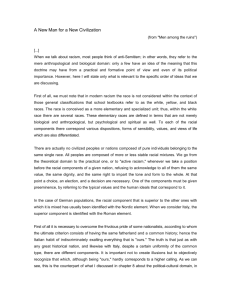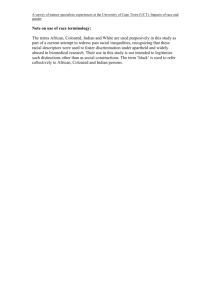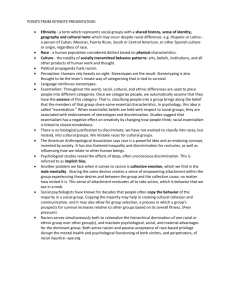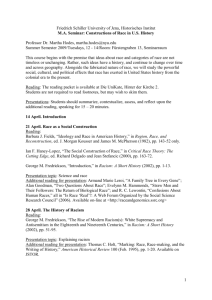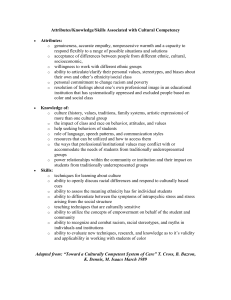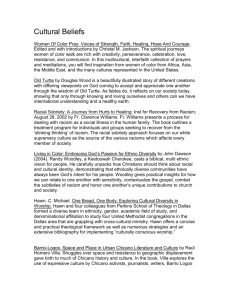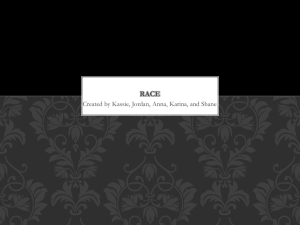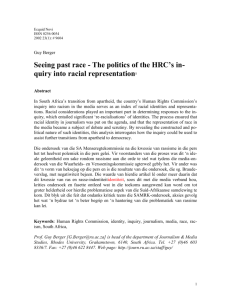DOC version. - Germantown Monthly Meeting
advertisement
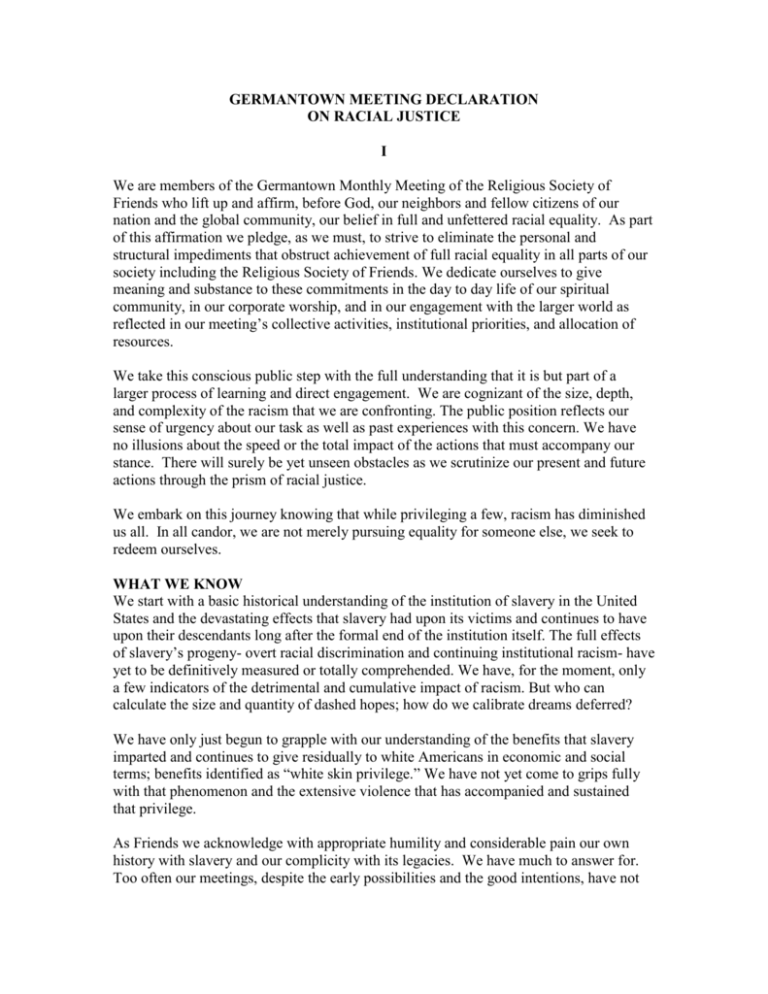
GERMANTOWN MEETING DECLARATION ON RACIAL JUSTICE I We are members of the Germantown Monthly Meeting of the Religious Society of Friends who lift up and affirm, before God, our neighbors and fellow citizens of our nation and the global community, our belief in full and unfettered racial equality. As part of this affirmation we pledge, as we must, to strive to eliminate the personal and structural impediments that obstruct achievement of full racial equality in all parts of our society including the Religious Society of Friends. We dedicate ourselves to give meaning and substance to these commitments in the day to day life of our spiritual community, in our corporate worship, and in our engagement with the larger world as reflected in our meeting’s collective activities, institutional priorities, and allocation of resources. We take this conscious public step with the full understanding that it is but part of a larger process of learning and direct engagement. We are cognizant of the size, depth, and complexity of the racism that we are confronting. The public position reflects our sense of urgency about our task as well as past experiences with this concern. We have no illusions about the speed or the total impact of the actions that must accompany our stance. There will surely be yet unseen obstacles as we scrutinize our present and future actions through the prism of racial justice. We embark on this journey knowing that while privileging a few, racism has diminished us all. In all candor, we are not merely pursuing equality for someone else, we seek to redeem ourselves. WHAT WE KNOW We start with a basic historical understanding of the institution of slavery in the United States and the devastating effects that slavery had upon its victims and continues to have upon their descendants long after the formal end of the institution itself. The full effects of slavery’s progeny- overt racial discrimination and continuing institutional racism- have yet to be definitively measured or totally comprehended. We have, for the moment, only a few indicators of the detrimental and cumulative impact of racism. But who can calculate the size and quantity of dashed hopes; how do we calibrate dreams deferred? We have only just begun to grapple with our understanding of the benefits that slavery imparted and continues to give residually to white Americans in economic and social terms; benefits identified as “white skin privilege.” We have not yet come to grips fully with that phenomenon and the extensive violence that has accompanied and sustained that privilege. As Friends we acknowledge with appropriate humility and considerable pain our own history with slavery and our complicity with its legacies. We have much to answer for. Too often our meetings, despite the early possibilities and the good intentions, have not been exemplary models of multiracialism. Many related Friends institutions, particularly our schools, were achingly slow in becoming racially integrated. The past is now prologue. In dealing with the legacy of slavery we draw upon and affirm solidarity with those who resisted slavery, those who worked tirelessly to end it, and those who sought to deal positively with the enormous burdens that were placed on freed slaves after slavery’s end and many years beyond. Quakers were very much in these ranks, disproportionate in influence to their numbers. We see ourselves continuing in their spirit. We would also identify ourselves with the modern civil rights movement, as a measure of what committed people can do in the face of deeply rooted racism. We positively note that because of actions taken over many years, many of us have seen major social changes in a relatively short period of time. Since the 1960s, the legal rationales for racial discrimination in major sectors of American life are now mostly gone. African Americans are employed in all sectors of the work force, and they are no longer invisible in public life. And, of course, an African American now holds the highest elected office in the land. WHY WE MUST ACT But to state these undeniable advances is also to acknowledge the enormous changes that must still take place. White racism remains a pervasive fact of American life. Certainly not as overt as it once was, racism is a malignant force deeply entrenched in all aspects of our daily lives and enmeshed in our social and economic structures. It can be seen in the higher percentage of African Americans among the poor and the unemployed; their disproportionate numbers among those who drop out of school, who die younger; and who are incarcerated. These disparities are glaring as measured by relative and absolute income levels, and in the availability of health care, and of quality, affordable housing. The list of material disparities goes on, operating in tandem with many internalized social attitudes shaped by centuries of the ideology of white supremacy. As members of a spiritual community that resides somewhat uneasily in the midst of a predominantly African American community in a city and world made up predominantly of people of color, Germantown Meeting has struggled with the implications of that fact. We have chosen to embrace our status but not the status quo. We see our position as one that challenges our beliefs and opens the way for our growth as a moral community; a community that will add to the sum total of social justice. Our affirmation as a meeting committed to racial justice comes after a rich, ongoing learning process. That process has included communal learning and sharing about continuing struggles for racial equality; a preliminary examination of the specifics of race relations in Germantown and Philadelphia; and a profound and sobering exploration of the extended encounter of African Americans with the Society of Friends. All of this has added to our sense of urgency. We must now act, in myriad ways, to implement our vision and to build upon the best of the Quaker tradition, experientially. We do not know with any absolute certainty where our commitment and related activities will ultimately take us. There will likely be mistakes, false starts, and various inadequacies. But our collective wisdom also tells us that our understanding of the need for racial justice brings us to this point and pushes us forward and outward. We anticipate learning more; more about the intersection of this concern with class and gender; more about the shifting racial and cultural dynamics of our communities; and more about ourselves and our capacity to transform ourselves and the world we live in. II WHAT WE MUST NOW DO There are no single activities that can end racism, nor can it be done by our meeting alone. We would support the leadings of individual members who feel called to act. But our early task is to focus and to then to learn from the sum total of our work. What follows are but a few activities that Germantown Meeting can undertake as part of its commitment: Continue our internal anti-racism education process Identify specific, discrete local projects that can be supported by the meeting and sustained by its members that work directly with racism’s effects such as projects of support of public school students or of prisoners; Increase our collaboration with other faith communities in our neighborhood to explore the possible undertaking of joint activities; Explore the meeting’s community profile and the possible expansion of its utility (particularly its public venues) to the broader community; Contact other Friends meetings and the Philadelphia Yearly Meeting to explore future collaboration and work on racial justice; Establish a fund that can strategically assist local initiatives in small but significant ways; Connect and collaborate with other work, within and without the meeting, that deal with other dimensions of this mandate such as immigration, Native Americans, economic exploitation, and militarism, as well as examine connections with other work (climate change, for example.) that may not seem as directly connected; Develop a regular audit of our meeting’s work in the light of this charge See this statement online at: http://gmm.gfsnet.org/gmm_justice.html
